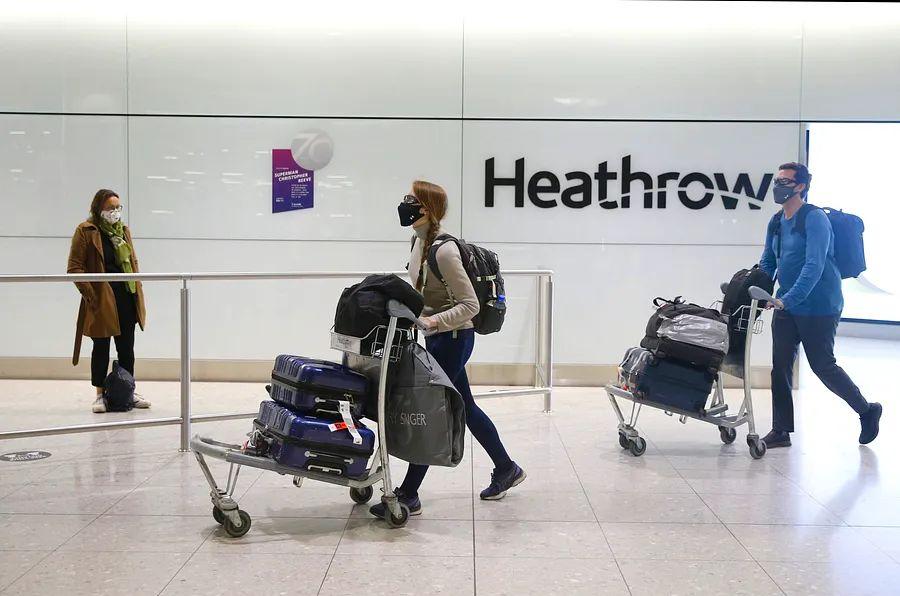Essential information for transiting through European airports during the pandemic

Since 2020, travel has evolved. This is no surprise to seasoned travelers. Trips that once required minimal documentation now demand thorough preparation. Do you need a COVID-19 test, and what type? Will you have to provide evidence of quarantine? And what about vaccination proof?
Latest Update: EU lifts travel restrictions for American visitors
Transiting through airports to reach your final destination has become even more intricate than before the pandemic. If you have a layover, will you need extra documentation to transit through the airport?
Today, we’re exploring various airports in Europe that American travelers might pass through on their journey. For instance, Paris Charles de Gaulle if you’re flying with Air France or its affiliates, or London Heathrow for those traveling with British Airways or its partners to their final destination.
In the end — like everything related to COVID-19 — the information and regulations are frequently updated. If you plan to travel to Europe this summer, it’s wise to verify transit requirements closer to your travel date to ensure nothing has changed.
 (Image by Niels Wenstedt/BSR Agency/Getty Images)
(Image by Niels Wenstedt/BSR Agency/Getty Images)Amsterdam Schiphol Airport (AMS)
Transit passengers: Permitted
COVID-19 test: Not necessary
The Netherlands allows passengers to travel to a third country through Schiphol. Those transiting via AMS no longer require a negative COVID-19 test. According to the Dutch government, if you begin your journey in a high-risk country and change flights in the Netherlands, you won’t need to present a negative PCR or rapid test upon arrival.
The government defines a transfer as changing planes and continuing your journey within a few hours, and certainly within one day, without leaving the airport where the transfer occurs.
KLM's website also confirms that if you are arriving from a high-risk country and have a transfer in the Netherlands, you do not need a COVID-19 test result, but you must fill out a quarantine declaration form.
For more details, visit the Netherlands' website.
Copenhagen Airport (CPH)
Transit passengers: Permitted
COVID-19 test: Mandatory
As stated by Copenhagen Airport, passengers transiting through the airport must present proof of a negative COVID-19 PCR or antigen test. This test should be conducted no more than 48 hours before boarding a flight to Denmark. This requirement does not apply to children aged 12 and under.
Passengers arriving in Denmark must also have undergone a COVID-19 test.
There is an exemption for fully vaccinated travelers from orange or yellow countries — currently, the U.S. is categorized as an orange country.
For further details, check Copenhagen Airport's website.
Dublin Airport (DUB)
Transit passengers: Uncertain
COVID-19 test: Mandatory
All travelers arriving in Ireland must present proof of a negative COVID-19 PCR test taken no more than 72 hours before arrival. However, it is still unclear whether Dublin Airport is facilitating large-scale transit connections for passengers.
Dublin Airport advises, "If you arrive at Dublin Airport as a connecting passenger, please reach out to the Irish Government's Border Management Unit (BMU) via email at [email protected] to learn about the specific entry requirements and restrictions that apply to you."
For additional details, visit Dublin Airport's website.
 (Image by Alex Kraus/Bloomberg via Getty Images)
(Image by Alex Kraus/Bloomberg via Getty Images)Frankfurt Airport (FRA)
Transit passengers: Permitted
COVID-19 test: Based on final destination
For passengers transiting through Frankfurt Airport to a third country, whether a negative COVID-19 test is required depends on both your departure and destination. If you are traveling from a non-Schengen country (like the U.S.) to another non-Schengen country (such as Russia), you will not need to present proof of vaccination, a negative COVID-19 test, or quarantine.
Conversely, if your final destination is a Schengen country (like Spain), you will need to provide either a negative COVID-19 test result or proof of vaccination or recovery.
The COVID-19 test must be taken no more than 48 hours before your arrival in Germany and will be verified by your airline before departure. Children aged 6 years and younger are exempt from this testing requirement. Accepted tests include PCR, LAMP, TMA, or antigen tests, but antibody tests are not valid.
This is also true for passengers intending to transit through Munich Airport (MUC).
For additional details, visit the German government's website.
Istanbul Airport (IST)
Transit passengers: Permitted
COVID-19 test: Not necessary
At Istanbul Airport, home to Turkish Airlines, transit passengers can pass through without needing a negative COVID-19 test result. Since December 30, 2020, those transiting are exempt from the requirement that mandates a negative COVID-19 PCR test for all travelers.
Transit passengers are also exempt from submitting a Turkey Entrance Form.
For more details, visit Istanbul Airport's website.
Lisbon Airport (LIS)
Transit passengers: Permitted
COVID-19 test: Mandatory
All travelers heading to Lisbon must provide a negative COVID-19 PCR test result — this includes those in transit. Whether traveling from within the EU or from outside to a destination in or out of the EU, a negative COVID-19 PCR test conducted within 72 hours prior to departure is required.
The test must be conducted by an accredited laboratory and include your name, the lab's name with its certification, a reference indicating it's a PCR test, the date the sample was taken, and the negative result. This test result must be shown at check-in or boarding in digital format; SMS results will not be accepted.
For further details, visit Lisbon Airport's website.
 (Photo by Hollie Adams/Getty Images)
(Photo by Hollie Adams/Getty Images)London Heathrow Airport (LHR)
Transit passengers: Permitted
COVID-19 test: Necessary
All travelers heading to the U.K., including those just transiting, must provide proof of a negative COVID-19 test result. Therefore, if you're planning to transit through London Heathrow (LHR) without leaving the airport, you still need to present a negative test result to board your flight.
The test must be conducted no earlier than three days prior to your departure for England, and you must show the result either as a printed document or on an email or text message on your phone. Arriving in England without a negative test could result in a £500 fine (approximately $700). Accepted tests include nucleic acid tests like PCR or LAMP, as well as antigen tests from lateral flow devices.
Additionally, you must complete a passenger locator form before your scheduled departure.
If your connecting flight departs on the same day, you can remain airside and won't need to go through immigration or customs, meaning no quarantine will be required, including hotel quarantine for transiting passengers.
However, if your onward travel involves separate tickets or if your next flight is on a different day, you must go through immigration. If you're arriving from a "red list country," you will be required to quarantine in a government-approved hotel while in the U.K. Passengers from non-red list countries must quarantine at another location during their stay. Currently, the United States is classified as an amber-list country.
More details can be found on Heathrow's website.
Madrid-Barajas Adolfo Suárez Airport (MAD)
Transit passengers: Permitted
COVID-19 test: Not necessary
Aena, the state-owned operator of Madrid Airport (MAD), also manages Barcelona Airport (BCN) and over 45 other airports across Spain. This guidance is applicable to all Spanish airports with international services.
As stated by the Ministerio de Sanidad, passengers in transit do not need to present a negative COVID-19 test result. As long as you remain in the international zone of the airport, a negative test is unnecessary. However, if your transit requires you to go through border control, you must show your boarding pass or ticket for subsequent flights to verify that your final destination is outside of Spain. Your total transit time should be under 24 hours, and you cannot exit the airport.
Passengers arriving from high-risk countries (including the United States) must provide a negative Active Infection Diagnostic Test (AIDT) or PCR test taken within 72 hours before arrival. Currently, Americans are not permitted to enter Spain for non-essential travel.
For further details, visit Aena's website.
 (Photo by Emeric Fohlen/NurPhoto via Getty Images)
(Photo by Emeric Fohlen/NurPhoto via Getty Images)Paris Charles de Gaulle Airport (CDG)
Transit passengers: Permitted
COVID-19 test: Not necessary
Paris Aeroport, which operates CDG, Paris Orly (ORY), and Paris Le Bourget (LBG), states that all three airports are "open and welcoming" to connecting travelers. Passengers transiting to a third country do not need to present a COVID-19 test certificate at the airport.
However, if your final destination mandates a negative COVID-19 test, you must obtain one before your journey. Note that CDG does not have PCR testing facilities. Furthermore, boarding may be denied if you are not permitted entry into your destination country.
For connections to flights within France or another Schengen country, the French entry policy will apply. France is now accepting American travelers as of June 9.
For additional details, visit Charles de Gaulle's website.
Zurich Airport (ZRH)
Transit passengers: Permitted
COVID-19 test: Not necessary
Zurich Airport states that passengers in transit are not required to present a negative COVID-19 PCR or rapid antigen test result. However, they must adhere to the rules set by their airlines and the destination countries. This means if a COVID-19 test is needed to enter your final destination, it will also be necessary for transit.
If you are connecting to a Schengen country, arrivals must comply with Switzerland's entry requirements. Currently, Americans cannot enter Switzerland unless they hold Swiss citizenship.
For further details, visit Zurich Airport's website.
In summary
In the end, it's probable that these restrictions will evolve. As travel restrictions begin to lift, more lenient policies may be implemented. Conversely, if new variants of concern emerge across Europe, airports might impose stricter regulations, even for transit passengers.
With Europe preparing to welcome fully vaccinated American tourists this summer, these major transit airports are likely to become valuable for travelers. Remember to closely monitor the entry requirements at your final destination. Even if you're allowed to transit through one of the mentioned airports, you must ensure that all necessary documentation is in order to kick off your vacation smoothly.
Evaluation :
5/5



